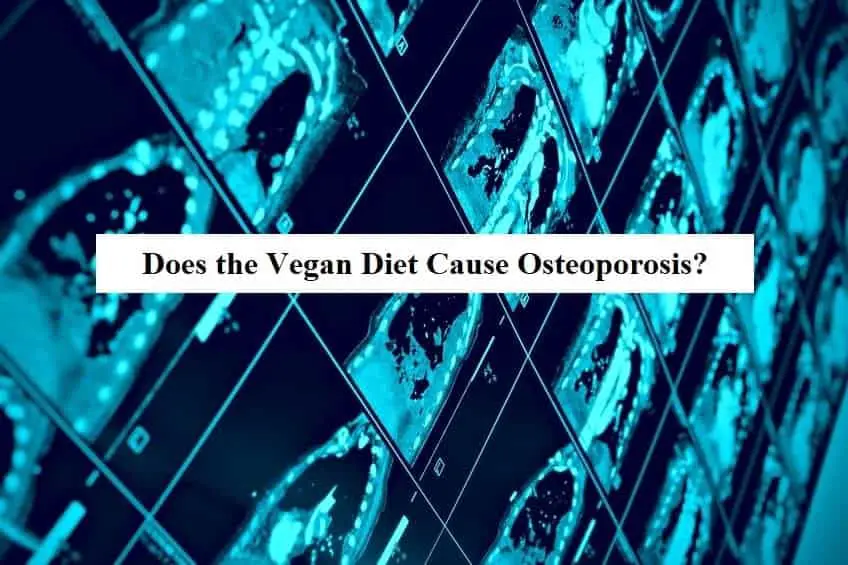When people think of foods that are conducive to bone health, the dairy food group tops the list. And because a vegan diet excludes the dairy group entirely, many wonder whether following a 100% plant-based diet eventually leads to osteoporosis. So I thought I’d quickly outline the relationship, if any, between the vegan diet and osteoporosis.
In short, does the vegan diet cause osteoporosis? The effect of a vegan, 100% whole food plant-based on bone mineralization in the long-term is unknown. But you will be glad to hear that according to a systematic review in the International Journal of Nursing Practice, there are mechanisms by which the vegan diet may be beneficial in retaining calcium, and by extension, improving bone mineral density.1
Anyway, the relationship between diet and bone health is a complicated tale involving all kinds of characters—vitamin D, calcium, animal proteins to name a few—and you’ll need to stay tuned for a more in-depth post on the physiology.
But for now, I’ll do my best to briefly summarize osteoporosis, basic bone physiology, and what the relevant literature has to say in the area of comparing different diets in the context of bone-related health outcomes.
Broadly speaking, there a couple of things to consider:
- Calcium in: the amount of calcium one consumes, absorbs, and assimilates into bone.
- Calcium out: the rate at which calcium is released into the bloodstream.
While a traditional, omnivorous diet contains copious amounts of calcium and vitamin D (#1), it also contains animal proteins which are widely thought to potentially speed up the rate at which calcium is seeped out of bone into the bloodstream (#2).
A Brief Overview of Osteoporosis
When you lose bone mass throughout the aging process, it can eventually lead to osteopenia or osteoporosis. Osteopenia is bone loss in which the body doesn’t make new bone as quickly as it reabsorbs old bone.
While osteopenia is more of a general term for bone loss, osteoporosis is the loss of bone mass wherein the bones become porous and fragile.
Our bones are in a constant cycle of renovation–being broken down, rebuilt, broken back down and so on. So when there’s a net loss of bone during this process over a long period of time, that’s a problem.
One distinction to make is that, though bones are made of calcium (among other components), calcium depletion from the bone over time isn’t quite the same as running low on some other mineral. The Vegan RD does a great job of pointing this out in her book, Vegan for Life.7
The thing is that c
For this reason, the body keeps levels of calcium in the blood quite stable. But in order to do this, pulls from the bone the necessary calcium to keep blood calcium levels within a predetermined narrow range.
So over time, the bones calcium inventory empties out, thus resulting in porous and weak bones. So when you read bone mineral density (BMD), it’s referring to the degree of mineralization of the bone matrix–how stocked the calcium shelves are.
There are two types of bone:
- Trabecular bone–the type of bone that contains calcium in a grid, or lattice-like structure. Ideally, it stores up calcium deposits throughout childhood into young adulthood so as to provide a calcium reserve for the future–like a retirement account. It is this calcium that’s used by the body when blood levels are low. However, unlike a retirement account, you end up tapping into calcium savings closer to age 30 than age 60 and thus have more time to deplete your stores. Hence, gradual bone loss begins to occur.
- Cortical bone–this is the dense outer layer of bone that serves as a protective shell. Unlike trabecular bone, these savings are more tightly locked in. It does eventually begin to lose mass, but it takes an extra decade for the process to begin.
The Vegan Diet and Osteoporosis
As you can imagine, porous bones are brittle and easily fractured. For this reason, when researchers want to determine the efficacy of taking this much vitamin D or that much calcium, they follow people undergoing an intervention over a period of time, in order to determine which group has the most fractures in their 80’s, etc.
Studies of vegetarian and vegan diets are no different. The problem is, there are no large-scale epidemiological studies that were designed specifically to determine the incidence of osteoporosis in populations with varying diet patterns.
Some smaller studies have been performed that compared vegetarian diets to omnivorous diets. And given these studies, there’s very little evidence overall to suggest that the BMD of Western meat eaters differs very much from that of Western lacto-ovo vegetarians.
Some early research suggested that vegetarians may have superior bone health, but studies shown since have demonstrated the opposite.2,3,4 So again, it’s a mixed bag.
In any case, these studies—as do most—involve vegetarians, and
One study of Taiwanese vegetarians measured bone density via measurement of the femoral neck and lumbar spine using dual-photon absorptiometry, showing them to be a higher risk of fracture.5
Then again, another study of 210 Buddhist nuns showed no difference vegans and omnivores despite lower calcium intake among the vegans.6
A Few Considerations
Despite the lack of research comparing various diets in the context of bone-related health outcomes, keep the following in mind.
AND Endorsement of the Vegan Diet
According to Academy of Nutrition and Dietetics (AND), a properly executed vegan, 100% plant-based diet is suitable for all stages of the life cycle.
Before you tell me they’re in bed with Big Bean or Big Barley, answer this: if you were on the AND board, would you endorse an unhealthy diet for your grandparents?
The Availability of Supplementation
We live in amazing times. Those of us fortunate enough to have access to food products made possible by modern technology are in a position to follow a diet that’s most conducive to our health, animal welfare, and the environment.

Keep in mind that the above-referenced studies that found a slight edge for lacto-ovo vegetarian and omnivore diets over vegan diets did not control for supplementation.
Remember, there are certain components found in animal products that are thought to potentially cause bone demineralization. A vegan diet with smart supplementation would be the best of both worlds.
Now, don’t get me wrong, you can pull off a vegan diet without any supplementation (with the possible exception of B12), but it would be much simpler to top off your RDAs and your DRIs, to make up for lack of dietary diversity, and varying bioavailability.
Anyway, that wraps it up for now. Please let me know if you have any questions or topics you’d like me to cover.
References
- Smith AM.
Veganism and osteoporosis: A review of the current literature. Int J Nurs Pract. 2006 Oct; 12(5): 302-6. - Ellis FR, Holesh S, Ellis JW.
Incidence of osteoporosis in vegetarians and omnivores. Am J Clin Nutr. 1972;25(6):555-558. - Sanchez TV, Mickelson O, Marsh AG, et al. Bone mineral density in elderly vegetarian and omnivorous females. In Mazeness RB, ed. Proceedings of the 4th International Conference on Bone Mineral Measurements. Bethesda, MD: National Institute of Arthritis, Metabolism, and Digestive Diseases;1980:94-98.
- Tylavsky FA, Anderson JJ. Dietary factors in bone health of elderly
lacto –ovo vegetarian and omnivorous women. Am J Clin Nutr. 1988;48(3 suppl):842-849. - Chiu, J.F., Lan, S.J., Yang, C.Y., et al. Long-term vegetarian diet and bone mineral density in postmenopausal Taiwanese women. Calcif. Tissue Int., 60, 245, 1997.
- Ho-Pham LT. Nguyen PL, Le TT, et al. Veganism, bone mineral density, and body composition: a study in Buddhist nuns. Osteoporos Int. 2009;20(12):2087-2093.
- Virginia Messina and Jack Norris. Vegan for Life: Everything You Need To Know To Be Healthy.


